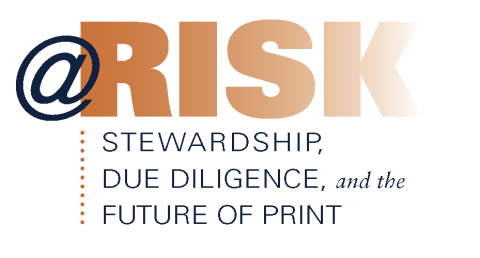For the last two decades a “perfect storm” has been building in North American academic and research libraries. Centuries of collecting has built vast holdings of printed materials, which collectively constitute an incomparable asset for researchers and a critical body of historical and cultural evidence. As these materials age, they inevitably deteriorate, and their degradation is accelerated by handling and use. Manmade and natural disasters, and lately extreme weather conditions brought about by climate change, also pose threats and increase the costs of stewardship.
Even with the emergence of electronic publishing, library print holdings continue to grow. At the same time libraries face mounting pressure to devote more available space to new learning and information-related activities. As a result, many of us must make consequential decisions about what holdings to develop, what holdings to retain, and what to withdraw from use, even discard. While the potential impact of such decisions demands due diligence, scant reliable data are available to guide those choices.
What is actually at risk here? The obvious danger is that unique, critical materials will be inadvertently lost or discarded. But one can imagine a whole hierarchy of risks. At the bottom of this hierarchy are the trivial: scholars are inconvenienced because needed materials are offsite or temporarily out of reach. At the top are the disastrous: unique, critical documentation becomes permanently lost to future researchers. The latter could provoke a loss of the community's trust in our profession on the order of the Nicholson Baker Double Fold controversy of 2001. Because responsible stewardship has been a distinguishing feature of libraries in our society, the impact of that loss would be immeasurable. I will say more about the hierarchy of risks in a subsequent post.
Given the stakes, libraries need to be clear about what “due diligence” at the institutional level at academic and independent research libraries means. We hope that at CRL's 2016 Collections Forum @Risk: Stewardship, Due Diligence, and the Future of Print, we can establish consensus among CRL libraries about how much due diligence in this environment, at this point in time, is enough, and how we justify our stewardship decisions to our administrations and to our communities.
Bernard F. Reilly
President (2001-2019)
Center for Research Libraries
